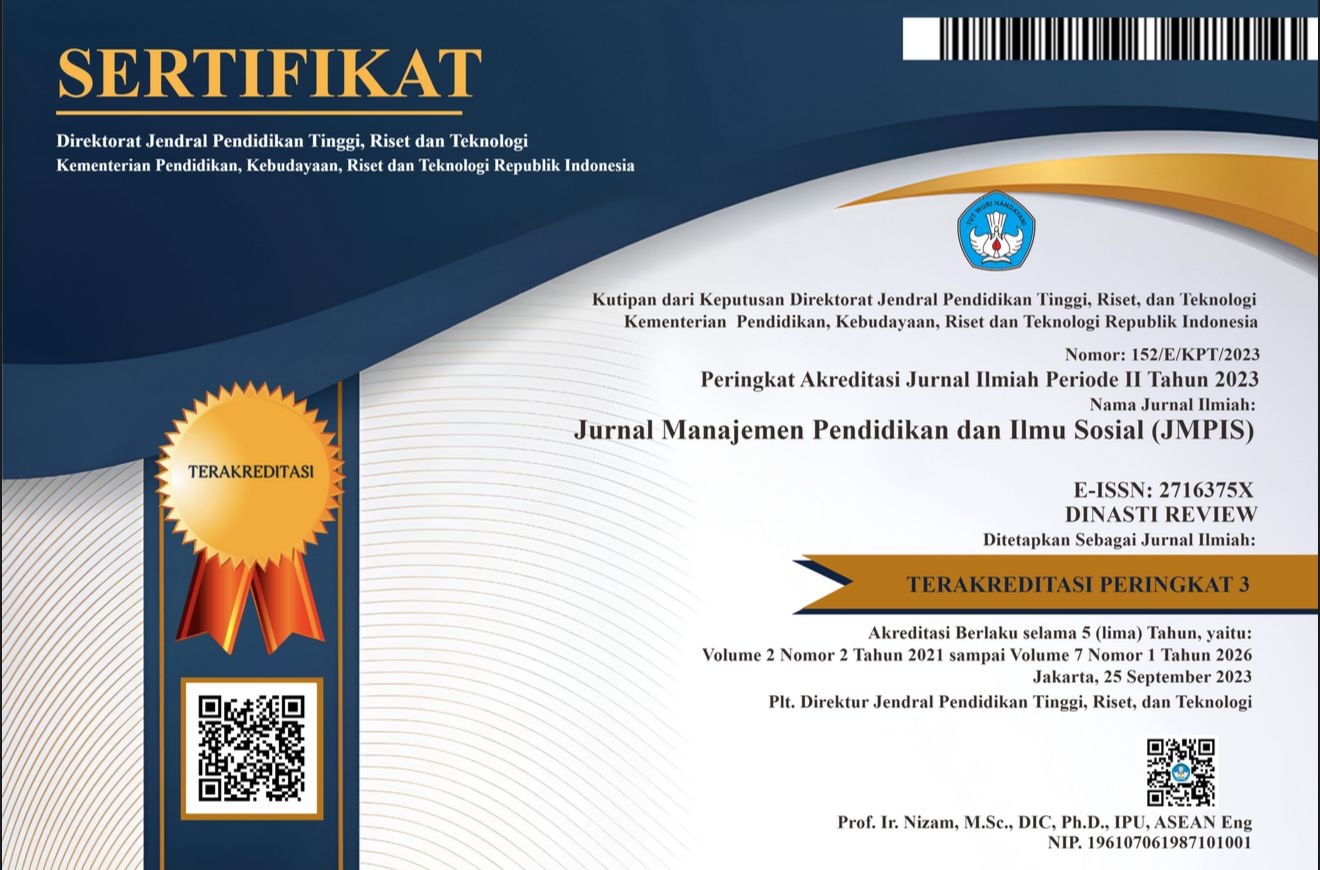Pendidikan Akhlak Dalam Kitab Bugyah Al-??lib Karya Syaikh ‘Abdull?h Al-Harar?
DOI:
https://doi.org/10.38035/jmpis.v5i5.2600Keywords:
Education, Morals and the Book of Bugyah Al-ṬȃlibAbstract
This study aims to analyse the biography of Shaykh 'Abdull?h Al-Harar? and the characteristics of Bugyah Al-??lib, to analyse the concept of Shaykh 'Abdull?h Al-Harar? regarding moral education and its division contained in Bugyah Al-??lib, and analysing the relevance of moral education in the book Bugyah Al-??lib by Shaykh 'Abdull?h Al-Harar? with moral education today. This research uses the library research method. Data analysis in this study was carried out using data analysis techniques with content analysis, namely: studying, examining and analysing the book Bugyah Al-??lib by Shaykh 'Abdull?h Al-Harar? recording the material in the form of a summary, looking for other references and collecting things related to the research, matching with relevant books, analysing the reading sources more deeply and drawing conclusions from the results of the research. The results of this study tell us that there are many moral education materials that must be owned by all humans, especially for a teacher and student of Islamic Education. All of these materials are contained in the book Bugyah Al-??lib by Shaykh 'Abdull?h Al-Harar?. The material consists of praiseworthy morals which are poured in the chapter on the obligations of the heart, disgraceful morals in the chapter on the sins of the heart, and 7 sins of the limbs consisting of the sin of the stomach, the sin of the eyes, the sin of the tongue, the sin of the ears, the sin of the hands, the sin of the farji, the sin of the feet, and the sin of the body. The purpose of Shaykh 'Abdull?h Al-Harar? writing this book is so that all people can easily learn religious knowledge, which is Fardlu 'Ain for every mukallaf. So that Islamic religious knowledge can be distributed easily and accepted by various groups of society, especially Islamic education.
References
Al-Ramthuni, Mu?ammad bin Nazih & Mu?ammad bin al-Athrasy. (2019). Al Qaul Al Jaliyy Penjelasan Ringkas Kitab Mukhtasar Abdullah Al-Harary. Jakarta Timur: Syahamah Press.
al-Harary, Abdullah. (2022). Bughyah al-Thalib lima'rifati al-ilmi ad-diinii al-waajib. Beirut: Syarikat Da al-Masyari'.
al-Bantani, Muhammad Nawawi. (2010). Mirqôtu Su’ûdu at-Tasd?q. Jakarta: Dar Al-Kutub Al-Islamiyah.
al-Harary, Abdullah. (2012). al-Maqolat as-sunniyah. Beirut: Syarikat Dar al-Masyari'.
al-Harary, Abdullah. (2018). Ash-Shirath al-Mustaqim (Jalan Yang Lurus). Jakarta Timur: Syahamah Press.
al-Thahawi, Abu Ja'far bin Mu?ammad. (1993). al-Aqidah al-Thahawiyah. Beirut: Dar al-Basyair al-Islami.
Al-Rayyi, Abdul Aziz ibn Ibrahim. (-). Awjazul Mukhtasarat. -: -
Asyhari. (2021). Akhlak Tasawuf. Kediri: IAIFA Press
Daulay, Haidar Putra dan Nurgaya Pasa. (2016). Pendidikan Karakter. Medan: CV Manhaji Medan.
Khunaifi, Aan Yusuf, and Matlani Matlani. (2019). Analisis Kritis Undang-Undang Sisdiknas Nomor 20 Tahun 2003. Jurnal Ilmiah Iqra’ 13, no. 2
Kholil, Syukur. (2006). Metodologi Penelitian Komunikasi. Bandung: Citapustaka.
Jampesi, Ihsan Mu?ammad Dahlan. (-). Siroju at-Thalibin. - : Haramain.
Syahamah. (2018). Aqidah ummat Islam. Jakarta Timur: Syahamah Press.
Zakiyah, Qiqi Yulianti & Rusdiana. (2014). Pendidikan Nilai. Bandung: CV Pustaka Setia.
Downloads
Published
How to Cite
Issue
Section
License
Copyright (c) 2024 Khairuddin Khairuddin, Azizah Hanum, Junaidi Arsyad

This work is licensed under a Creative Commons Attribution 4.0 International License.
Hak cipta :
Penulis yang mempublikasikan manuskripnya di jurnal ini menyetujui ketentuan berikut:
- Hak cipta pada setiap artikel adalah milik penulis.
- Penulis mengakui bahwa Jurnal Manajemen Pendidikan dan Ilmu Sosial (JMPIS) berhak menjadi yang pertama menerbitkan dengan lisensi Creative Commons Attribution 4.0 International (Attribution 4.0 International CC BY 4.0) .
- Penulis dapat mengirimkan artikel secara terpisah, mengatur distribusi non-eksklusif manuskrip yang telah diterbitkan dalam jurnal ini ke versi lain (misalnya, dikirim ke repositori institusi penulis, publikasi ke dalam buku, dll.), dengan mengakui bahwa manuskrip telah diterbitkan pertama kali di Jurnal Manajemen Pendidikan dan Ilmu Sosial (JMPIS).











































































